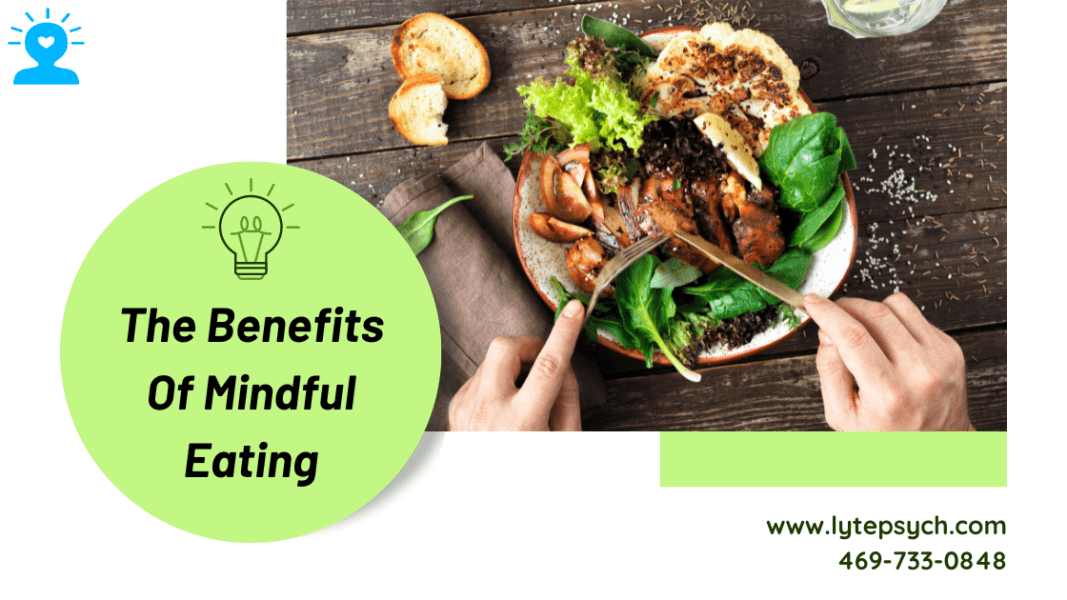Wed Apr 17 2024
The Benefits of Mindful Eating: Cultivating Awareness and Connection to Food at Lyte Psychiatry (Best Adults and Adolescents Psychiatrist and Therapist Near You), Best Psychiatrist and Therapist, Dallas, Fort Worth, TX

Introduction from Lyte Psychiatry to Mindful Eating (Affordable Psychiatrist & Therapist Near You)
Mindful eating is a practice that involves paying full attention to the experience of eating and drinking, both internally and externally. It encourages individuals to cultivate awareness of their thoughts, feelings, and sensations related to food without judgment.
At Lyte Psychiatry, we recognize the profound impact that mindful eating can have on emotional well-being and overall health.
Understanding Mindful Eating
Principles of Mindful Eating
Mindful eating is rooted in mindfulness, a practice that involves being fully present and engaged in the present moment. When applied to eating, mindfulness encourages individuals to slow down, savor each bite, and tune into their body's hunger and fullness cues. It involves non-judgmental awareness of the taste, texture, and aroma of food, as well as the sensations of hunger and satiety.
Benefits of Mindful Eating
Practicing mindful eating has numerous benefits for physical, mental, and emotional health. It can help individuals develop a healthier relationship with food, reduce overeating and binge eating, and promote weight management. Mindful eating has also been shown to enhance digestion, increase satisfaction with meals, and improve overall well-being.
The Importance of Cultivating Awareness
Cultivating awareness through mindful eating allows individuals to become more attuned to their body's signals and needs. By paying attention to hunger and fullness cues, individuals can make informed choices about when, what, and how much to eat, rather than relying on external cues or emotional triggers. This increased awareness fosters a sense of empowerment and autonomy in food choices.
Connection to Food and Emotional Well-being
Mindful eating emphasizes the connection between food, emotions, and mental health. Many individuals use food as a coping mechanism to manage stress, anxiety, or other emotional challenges. By practicing mindful eating, individuals can develop healthier coping strategies and learn to distinguish between physical hunger and emotional hunger. This allows for a more balanced and nourishing relationship with food.
Introducing Lyte Psychiatry's Approach
At Lyte Psychiatry, we believe in taking a holistic approach to mental health and wellness. Our team of experienced professionals incorporates mindful eating principles into our treatment approach, recognizing the integral role that nutrition and lifestyle play in emotional well-being. We offer personalized support and guidance to help individuals cultivate mindfulness in their eating habits and enhance their overall health.
Incorporating Mindful Eating into Your Daily Life
Practical Tips for Mindful Eating
Eat slowly: Take your time to chew each bite thoroughly and savor the flavors.
Eliminate distractions: Minimize distractions such as television, smartphones, or work during meals to focus on the eating experience.
Pay attention to hunger cues: Tune into your body's signals of hunger and fullness, eating when hungry and stopping when satisfied.
Practice gratitude: Take a moment to appreciate the nourishment and pleasure that food provides.
Overcoming Challenges
By approaching these challenges with compassion and curiosity, individuals can gradually cultivate a more mindful relationship with food and overcome obstacles to healthy eating.
Seek for Professional Support at Lyte Psychiatry (Best Psychiatrist and Therapist Near You)
Mindful eating offers numerous benefits for physical, mental, and emotional health, allowing individuals to cultivate awareness and connection to food. At Lyte Psychiatry, we believe in the power of mindful eating to enhance overall well-being and support individuals on their journey to emotional wellness.
To schedule an appointment. Click Here
To see our services. Click Here
Call us if you have questions at 469-733-0848
FAQs
Q: Can anyone practice mindful eating?
A: Yes, mindful eating is accessible to people of all ages and backgrounds. It's a skill that can be developed through practice and can benefit anyone seeking a healthier relationship with food.
Q: How can mindful eating help with weight management?
A: By tuning into hunger and fullness cues, individuals can make more mindful food choices and reduce overeating or emotional eating, which can contribute to weight management goals.
Q: Can mindful eating help with emotional eating?
A: Yes, mindful eating can be an effective strategy for managing emotional eating by helping individuals distinguish between physical hunger and emotional hunger and develop healthier coping mechanisms.
Q: How long does it take to see the benefits of practicing mindful eating?
A: The timeline for experiencing benefits from mindful eating varies for each individual and depends on factors such as consistency, commitment, and willingness to practice. Some people may notice improvements relatively quickly, while others may require more time and practice.